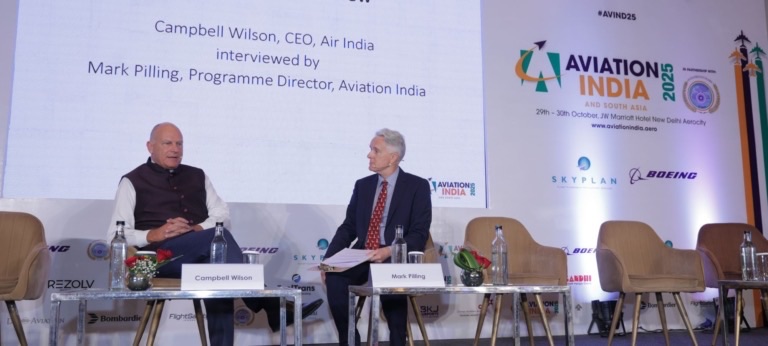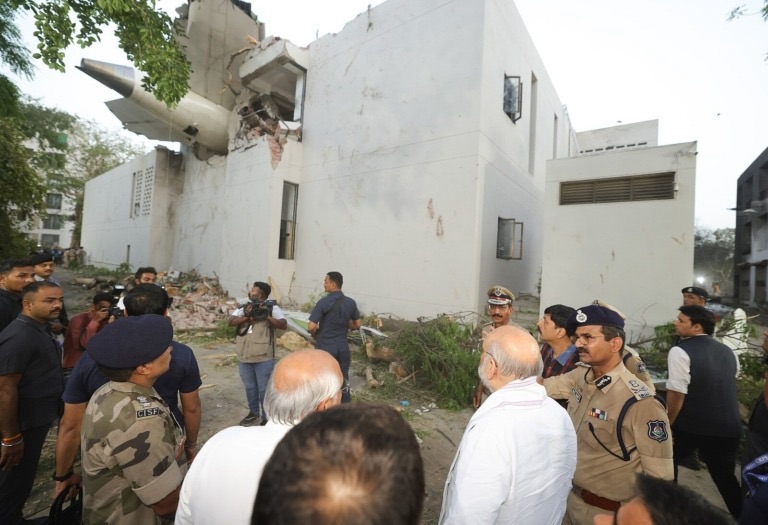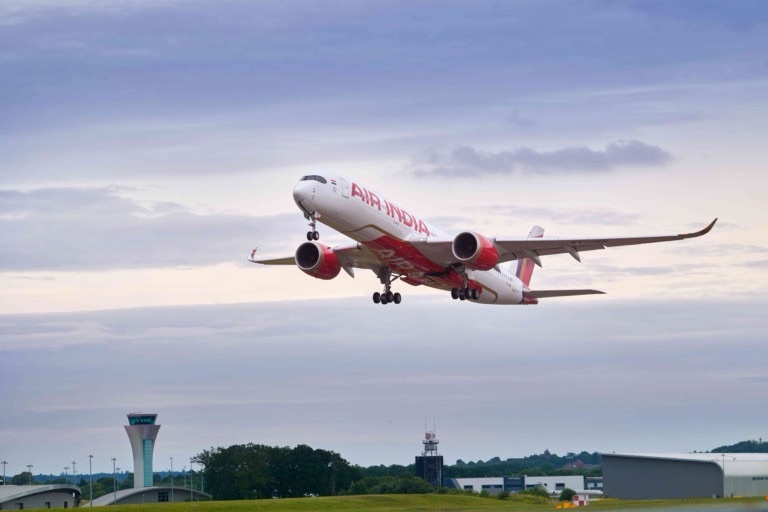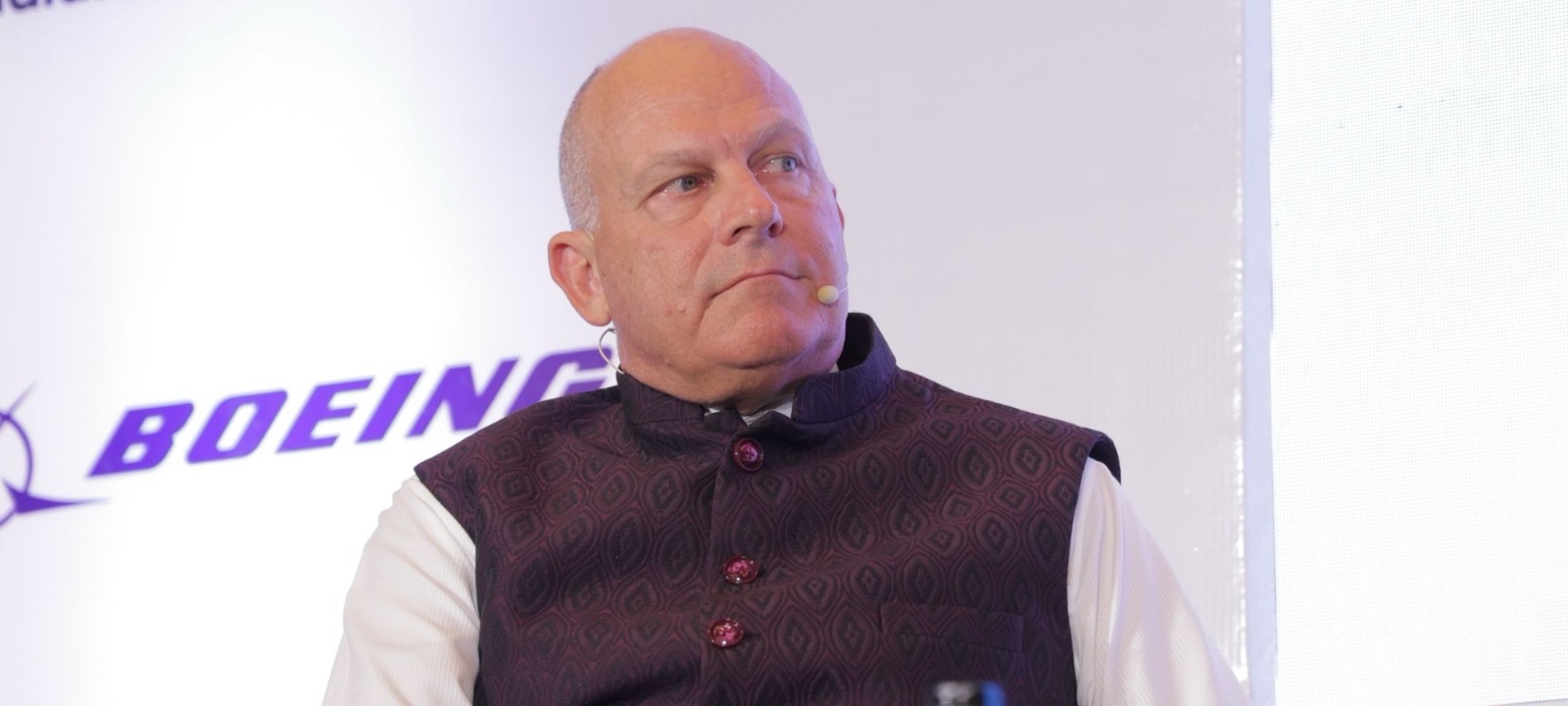For the first time since the tragic Dreamliner incident, Air India’s CEO addressed the audience at Aviation India, presenting comprehensive plans for the airline’s growth.
In his inaugural public appearance following the unfortunate Air India crash on June 12, CEO Campbell Wilson detailed the airline’s ambitious overhaul. He also reiterated Air India’s dedication to safety, enhancing customer experiences, and India’s expanding significance in the global aviation arena.
Wilson spoke at this year’s Aviation India Summit & Exhibition held in Delhi from October 29 to 30. He portrayed a “new Air India” that is currently evolving, supported by one of the largest fleet renewal initiatives in the world.
The airline intends to incorporate 524 new aircraft into its fleet by 2031, featuring a combination of Boeing 787s, 777s, and Airbus A350s.

“We’re progressing towards a level that is, in many ways, globally competitive,” Wilson remarked during a fireside discussion.
“The uniqueness of India’s aviation sector lies in its warmth and hospitality. That’s the key element – the genuine service and sincere care. At Air India, we are enhancing our core offerings, but the finishing touch is the consistent warmth and authentic hospitality provided by our crew and ground staff that engage with our passengers. As we integrate all the various facets of the new Air India, I am genuinely enthusiastic about what lies ahead.”
Currently, Air India operates more than 300 aircraft, with a flight departing every 65 seconds.
Recovery following the tragedy of Air India flight 171
Reflecting on the tragic events of June 12, when Air India Flight 171 tragically crashed at Ahmedabad Airport just seconds after take-off, Wilson conveyed his profound grief.

“It is truly heartbreaking for all those affected,” he stated. “We are doing everything possible to assist those impacted.”
He outlined the measures that Air India and its parent firm, Tata Group, have undertaken to support the families and staff affected. The airline has deployed over 600 personnel on the ground in Ahmedabad, while Tata has set up a trust to provide ongoing assistance for those impacted.
Wilson also mentioned that the preliminary report “indicated that there were no issues with the aircraft, the engines, or the operation of the airline. We await the final report, and if there are lessons to glean from it, we will certainly ensure they are implemented.”
In the interim, he emphasized: “Our commitment remains to do everything we can, for as long as necessary, to provide closure for those affected.”
Following the incident, Air India voluntarily scaled back its international operations by 15% to facilitate additional inspections and crew rest. Operations have now returned to regular levels, with the airline instituting additional safety protocols.
However, reports from earlier this week suggest that the airline has requested at least ₹100 billion ($1.14 billion) in assistance from its shareholders, Tata Sons and Singapore Airlines, to stabilize operations, enhance safety systems, and restore public confidence in the brand.
Air India’s transformation amid global challenges
Emphasizing that Air India’s transformation is a long-term endeavor, Wilson noted that it is occurring against a backdrop of global supply chain difficulties, regulatory intricacies, and geopolitical unrest. Nevertheless, with a substantial order of 524 aircraft on the horizon, the airline anticipates adding a new aircraft approximately every six days.

The pivotal moment will arrive in early 2026 (when the first fully refurbished widebody will be introduced), signifying when “we will genuinely begin to witness the emergence of the new Air India,” Wilson stated.
By 2027, the airline aims to have completely updated its 787 fleet, followed by the refurbishment of its 777s by early 2028. The new interiors will boast improved seating and inflight entertainment systems, along with the introduction of new A350s linking Delhi to London, New York, and beyond.
According to Wilson, while equipping narrowbody aircraft is “relatively straightforward,” the process for widebody aircraft, especially for first and business class cabins, can take up to four years for business class seats and as long as seven years for first class seats in terms of specifications, design, certification, manufacturing, and installation. There is no way to expedite that process.
“For Air India, this represents a five-year transformation that encompasses restructuring, refurbishing, training, and establishing the infrastructure necessary to support rapid growth,” he remarked.
This infrastructure includes new training academies for thousands of pilots and cabin crew, expanded maintenance and engineering facilities, and enhanced IT systems to integrate four merged airlines.

Why India is poised to be a global player
Wilson framed Air India’s expansion within the larger narrative of India’s ascent as an aviation powerhouse. With a swiftly expanding middle class and a significant diaspora, India is on track to become one of the largest air travel markets globally. The nation is also progressing toward becoming the world’s third-largest economy.
Wilson further highlighted the necessity for a “balanced liberalization” of air access to ensure that Indian carriers can compete equitably with foreign airlines that enjoy earlier access to slots and hubs.

Preparing for the arrival of Air India’s 524 aircraft
Despite challenges, including airspace restrictions over Pakistan and the Middle East, as well as global economic uncertainty, Wilson remains hopeful while recognizing the efforts required ahead.
“We must prepare the organization for the arrival of these 524 aircraft, which entails training pilots from scratch and subsequently developing simulators to keep them current and skilled. We also need training academies to cultivate cabin crew, numbering in the thousands.
For Wilson, the objective is unmistakable: to transform India’s national airline into a genuinely global carrier that embodies the nation’s aspirations and identity.
For all aviation-related guidance (DGCA ground classes, pilot training, cabin crew training)
Contact us https://contrail.in/
phone numbers +91 78457 69399


